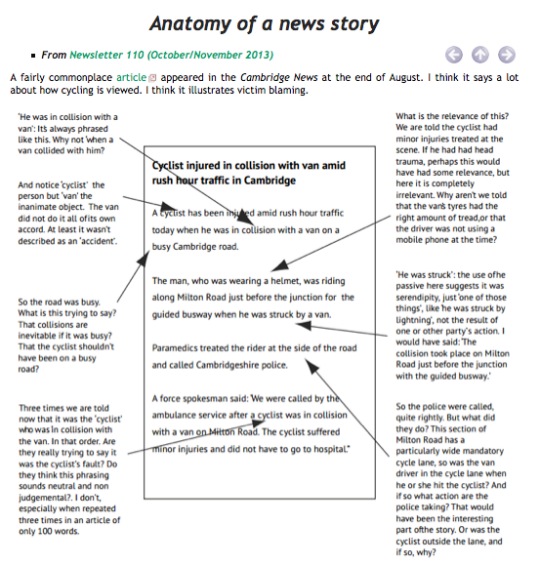“The term ‘cyclist’ continues to provide us with a damaging mental barrier and convenient scapegoat. It serves only to alienate and denigrate an entire segment of society, and cast them aside as ‘others’.”
— Chris Bruntlett, via Hush Magazine
In our ongoing effort to raise awareness about how the words we use establish (sometimes harmful) cultural norms and have a major impact on our discussions around traffic safety and bicycling, we’re bringing back our Language Matters column.
While many people still don’t get why we take this issue so seriously, we are heartened by two recent examples we’ve come across that help make the case that this is something worthy of consideration and action.
The first is an excellent essay by Vancouver (Canada) resident Chris Bruntlett titled, I Am Not a Cyclist which was published on Hush Magazine’s website last week. Chris emailed us to share the essay and said he was inspired to write it after an appearance on a local talk radio show where the host referred to him as an “avid cyclist” throughout the interview. Chris said he had recently watched Áron Halász’s Cyclists Do Not Exist Tedx talk and he read our story from last month about a researcher’s work on language use and bike advocacy.
Here’s an excerpt from Chris’s essay:
I am no more an avid cyclist than I am an avid walker or avid eater. I am someone who often uses a bicycle, simply because it is the most civilized, efficient, enjoyable, and economical way to get around my city… As well as possessing a bike, I also own a share in the Modo car co-op, a Compass Card, and many pairs of shoes. The bicycle is merely a means to an end. It is a tool which does not convert me into a cyclist, any more than vacuuming my apartment turns me into a janitor, or brushing my teeth transforms me into a dental hygienist.
In a local context, the term ‘cyclist’ continues to provide us with a damaging mental barrier and convenient scapegoat. It serves only to alienate and denigrate an entire segment of society, and cast them aside as ‘others’.
Chris also shares his belief that as his city’s infrastructure and culture slowly (but surely) change toward being more sensitive to bicycling it will no longer be a political or environmental statement. “Then, and only then,” he writes, “will we stop identifying folks as ‘cyclists’, and treat them as individuals, with a diverse range of politics, incomes, ethnicities, careers, and interests.”
And he ends with a simple request:
So please, stop calling me a cyclist. I’m a husband, a father, a designer, a writer, a photographer, a filmmaker, a musician, a humanist, an urbanist, a vegetarian, and a football supporter. But most importantly, I’m the citizen of a multi-modal city. The bicycle is but a minor detail.
Read the full essay at HushMagazine.com.
Our second item is the Anatomy of a news story posted in the current newsletter of the Cambridge (UK) Cycling Campaign (and brought to our attention by Steven Vance). The author, Raymond Brown, takes a recent news article about a traffic collision and examines each section based on the article’s choice of words and language style. He takes on issues people often discuss here on BikePortland such as: Why the reporter mentions helmet use; implications of blame in relation to the word “collision”; and so on.

Here’s Brown’s criticism with the news article’s use of a common phrase:
‘He was struck’: the use of the passive here suggests it was serendipity, just ‘one of those things’, like ‘he was struck by lightning’, not the result of one or other party’s action. I would have said: ‘The collision took place on Milton Road just before the junction with the guided busway.’
What struck me about Brown’s post was that the news article he featured is almost identical to hundreds of similar articles posted to the web nearly every day. What I’ve found (at least here in the States), is that those short statements about collisions are often posted by news organizations verbatim from police statements. While that in and of itself isn’t a terrible thing to do, it’s very rare that the news outlet will present the information as being copy/pasted from the police (I think that’s an important distinction).
Read more at CamCycle.org.uk.
I think both of these posts offer important takeaways about language use and how it impacts our perceptions.
— More from our Language Matters series here.

